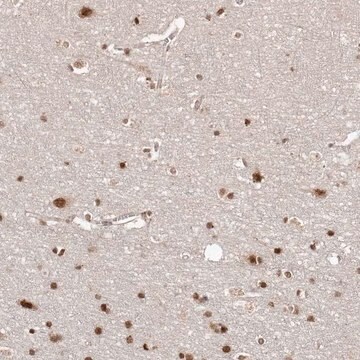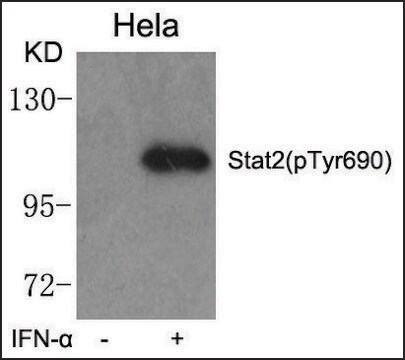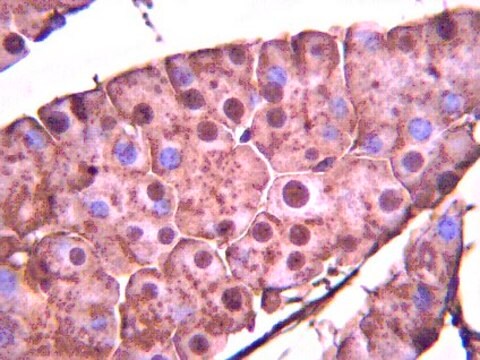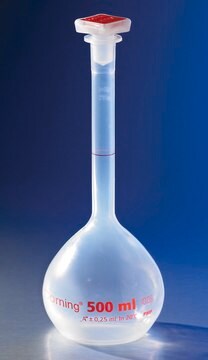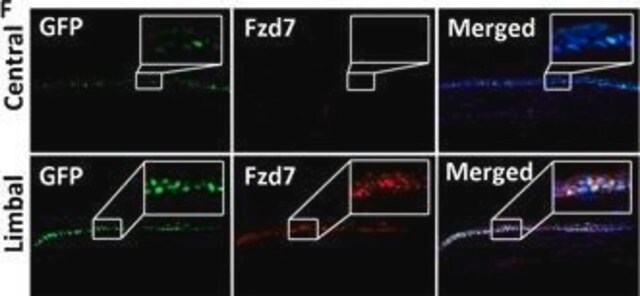推荐产品
生物源
rabbit
品質等級
共軛
unconjugated
抗體表格
affinity isolated antibody
抗體產品種類
primary antibodies
無性繁殖
polyclonal
形狀
buffered aqueous solution
分子量
47 kDa
物種活性
rabbit, rat, guinea pig, bovine, mouse, human, dog
濃度
0.5 mg - 1 mg/mL
技術
immunohistochemistry: suitable
western blot: suitable
NCBI登錄號
UniProt登錄號
運輸包裝
wet ice
儲存溫度
−20°C
目標翻譯後修改
unmodified
基因資訊
human ... SOX4(6659)
一般說明
SRγ (sex determining region γ) (SOX) are HMG box containing transcription factors that bind to the minor groove of DNA. Sox proteins family members regulate a variety of aspects of development. SRγ (sex determining region γ)-box 4 (SOX4, EVI16, SRγ) is required for differentiation and proliferation in many tissues, including various cancers. Sox4 acts in part by stabilizing β-catenin. Sox4 is required for lymphocyte development. It is an early factor in B-cell differentiation.
SRY (sex determining region Y) (SOX) are high-mobility-group (HMG) box containing transcription factors, that binds to the minor groove of DNA. SRY box 4 (SOX4) is a member of the SOX family of transcription factors. It is expressed majorly in normal and neoplastic gut tissues. SOX4 gene is located on human chromosome 6p22.3.
特異性
Anti-SOX4 polyclonal antibody reacts with bovine, canine, human, mouse, rat, zebrafish, and chicken SRγ (sex determining region γ)-box 4 proteins.
免疫原
Synthetic peptide directed towards the N terminal region of human SOX4
應用
Anti-SOX4 polyclonal antibody is used to tag SRγ (sex determining region γ)-box 4 for detection and quantitation by Western blotting and in plasma by immunohistochemical (IHC) techniques. It is used as a probe to determine the roles of SRγ (sex determining region γ)-box 4 in cell differentiation and proliferation, such as B-cell differentitation.
生化/生理作用
SRY box 4 (SOX4) is required for differentiation and proliferation in many tissues, including various cancers. It stabilizes β-catenin. Sox4 is essential for lymphocyte development. It acts as an early factor in B-cell differentiation. SOX4 is involved in the regulation of embryonic development and the determination of cell fate. It acts as a transcriptional regulator after forming syndecan binding protein (syntenin), a protein complex. SOX4 modulates the apoptosis pathway, which leads to cell death and tumorigenesis. It regulates downstream effects of parathyroid hormone (PTH) and PTH-related protein (PTHrP) in bone development.
序列
Synthetic peptide located within the following region: STASTGGKADDPSWCKTPSGHIKRPMNAFMVWSQIERRKIMEQSPDMHNA
外觀
Purified antibody supplied in 1x PBS buffer with 0.09% (w/v) sodium azide and 2% sucrose.
免責聲明
Unless otherwise stated in our catalog or other company documentation accompanying the product(s), our products are intended for research use only and are not to be used for any other purpose, which includes but is not limited to, unauthorized commercial uses, in vitro diagnostic uses, ex vivo or in vivo therapeutic uses or any type of consumption or application to humans or animals.
未找到合适的产品?
试试我们的产品选型工具.
儲存類別代碼
10 - Combustible liquids
水污染物質分類(WGK)
WGK 2
閃點(°F)
Not applicable
閃點(°C)
Not applicable
Sox4 is required for the survival of pro-B cells
Sun B, et al.
Journal of Immunology, 190(5), 2080-2089 (2013)
SOX4 inhibits GBM cell growth and induces G0/G1 cell cycle arrest through Akt-p53 axis
Zhang J, et al.
BMC Neurology, 14(1), 207-207 (2014)
Syntenin-mediated regulation of Sox4 proteasomal degradation modulates transcriptional output
Beekman JM, et al.
Oncogene, 31(21), 2668-2679 (2012)
Sox17 and Sox4 differentially regulate beta-catenin/T-cell factor activity and proliferation of colon carcinoma cells
Sinner D, et al.
Molecular and Cellular Biology, 27(22), 7802-7815 (2007)
Shuang Pan et al.
Journal of biochemical and molecular toxicology, 36(1), e22910-e22910 (2021-12-21)
Exposure to high doses of anticancer drugs can induce the emergence of a subpopulation of weakly proliferative and drug-tolerant cells. Drug tolerance can reduce the benefits obtained from canonical treatment and reduce the survival rate of patients. Regulation of SRY-related
我们的科学家团队拥有各种研究领域经验,包括生命科学、材料科学、化学合成、色谱、分析及许多其他领域.
联系技术服务部门